-
 Bitcoin
Bitcoin $106,754.6083
1.33% -
 Ethereum
Ethereum $2,625.8249
3.80% -
 Tether USDt
Tether USDt $1.0001
-0.03% -
 XRP
XRP $2.1891
1.67% -
 BNB
BNB $654.5220
0.66% -
 Solana
Solana $156.9428
7.28% -
 USDC
USDC $0.9998
0.00% -
 Dogecoin
Dogecoin $0.1780
1.14% -
 TRON
TRON $0.2706
-0.16% -
 Cardano
Cardano $0.6470
2.77% -
 Hyperliquid
Hyperliquid $44.6467
10.24% -
 Sui
Sui $3.1128
3.86% -
 Bitcoin Cash
Bitcoin Cash $455.7646
3.00% -
 Chainlink
Chainlink $13.6858
4.08% -
 UNUS SED LEO
UNUS SED LEO $9.2682
0.21% -
 Avalanche
Avalanche $19.7433
3.79% -
 Stellar
Stellar $0.2616
1.64% -
 Toncoin
Toncoin $3.0222
2.19% -
 Shiba Inu
Shiba Inu $0.0...01220
1.49% -
 Hedera
Hedera $0.1580
2.75% -
 Litecoin
Litecoin $87.4964
2.29% -
 Polkadot
Polkadot $3.8958
3.05% -
 Ethena USDe
Ethena USDe $1.0000
-0.04% -
 Monero
Monero $317.2263
0.26% -
 Bitget Token
Bitget Token $4.5985
1.68% -
 Dai
Dai $0.9999
0.00% -
 Pepe
Pepe $0.0...01140
2.44% -
 Uniswap
Uniswap $7.6065
5.29% -
 Pi
Pi $0.6042
-2.00% -
 Aave
Aave $289.6343
6.02%
What are the common methods for generating Ethereum wallet addresses?
Ethereum wallet addresses are generated cryptographically, offering varying security levels depending on the method: online, software, or hardware wallets. Each provides different levels of control and security, with hardware wallets being the most secure but also the most expensive.
Mar 12, 2025 at 12:50 am
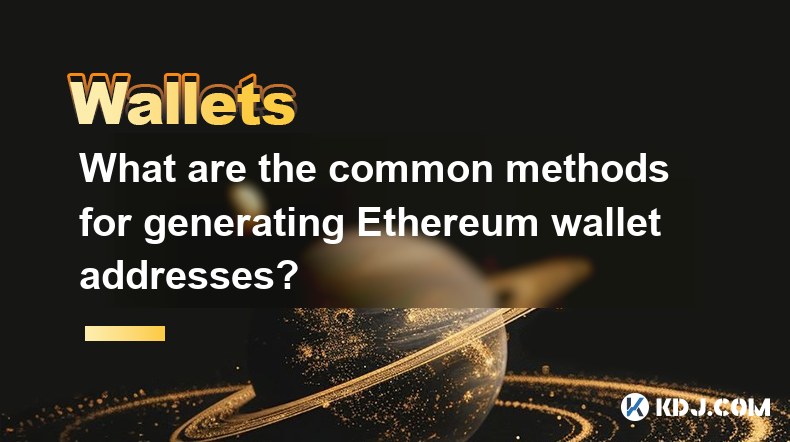
Key Points:
- Ethereum wallet addresses are generated using cryptographic techniques, ensuring uniqueness and security.
- Several methods exist, ranging from using online wallets to creating your own with software or hardware.
- Each method offers varying levels of security and control, influencing the choice for different users.
- Understanding the underlying principles of key generation is crucial for secure wallet management.
- Security best practices are paramount regardless of the chosen address generation method.
What are the common methods for generating Ethereum wallet addresses?
Generating an Ethereum wallet address involves creating a unique cryptographic key pair. This key pair comprises a private key (kept secret) and a public key (used to receive Ether and tokens). The public key is then converted into an address, a shortened version displayed on the blockchain. Several methods facilitate this process:
1. Using Online Wallets:
Many online services offer Ethereum wallets. These platforms handle the key generation process for you. Simply create an account and the wallet is automatically generated. The ease of use comes at the cost of relinquishing control over your private keys to the service provider. Security relies heavily on the platform's security measures. Examples include MetaMask, Trust Wallet, and Coinbase Wallet.
2. Using Software Wallets:
Software wallets, like MyEtherWallet or Parity, are downloaded and installed on your computer. These provide more control than online wallets, as you manage your keys locally. However, security depends on your computer's security and the software's integrity. It's crucial to download only from official sources and protect your computer from malware.
3. Using Hardware Wallets:
Hardware wallets, such as Ledger and Trezor, are physical devices storing your private keys offline. This is the most secure method. They offer a high degree of protection against hacking and malware. However, they are typically more expensive than other options. Losing the device means losing access to your funds.
4. Generating Addresses Manually:
This method requires a deep understanding of cryptography and is generally not recommended for beginners. It involves using cryptographic libraries and algorithms to generate a key pair. Errors during this process can render your wallet unusable or compromise its security. Expertise in cryptography and secure coding practices are essential.
Understanding Key Generation:
The core of any Ethereum wallet address generation lies in the creation of a private key. This is usually a random 256-bit number. From this private key, a public key is derived using elliptic curve cryptography (ECC). The Ethereum address is then generated by hashing the public key using Keccak-256, a cryptographic hash function. This process ensures that each address is unique and prevents collisions.
Security Considerations:
Regardless of the method, securing your wallet is paramount. Never share your private key with anyone. Be wary of phishing scams and only use reputable wallet providers. Regularly back up your wallet and keep your software updated. For hardware wallets, ensure you have a recovery seed phrase safely stored in a secure location.
Common Questions and Answers:
Q: Are online wallets safe?
A: Online wallets offer convenience but compromise control over your private keys. Their safety relies on the platform's security. Use only reputable providers and practice strong password hygiene.
Q: What is a private key and why is it so important?
A: A private key is a secret number that allows you to access and control your Ethereum funds. Without it, you cannot spend your cryptocurrency. Losing or compromising it results in irreversible loss of funds.
Q: How do I choose the right wallet type?
A: The best wallet type depends on your technical skills and security needs. Beginners might prefer online wallets for ease of use, while experienced users may opt for hardware wallets for maximum security. Software wallets offer a middle ground.
Q: What happens if I lose my private key or hardware wallet?
A: Losing your private key or hardware wallet means losing access to your Ethereum funds. It's crucial to back up your wallet securely and store your recovery phrase in a safe place.
Q: Can I generate multiple addresses from a single private key?
A: No, each private key corresponds to a single Ethereum address. However, you can create multiple wallets, each with its own private key and address.
Q: Is it possible to recover an Ethereum address if I forget my password?
A: Recovery depends on the type of wallet. Online wallets may offer password recovery options, but hardware and software wallets rely on your backup seed phrase. Without it, recovery is generally not possible.
Q: What is a seed phrase and how important is it?
A: A seed phrase (or recovery phrase) is a list of words that allows you to restore your wallet if you lose access to it. It is crucial to keep this phrase safe and secure; losing it results in the irreversible loss of your funds. It's as important as the private key itself.
Q: How does Ethereum ensure the uniqueness of wallet addresses?
A: The combination of cryptographic hashing and elliptic curve cryptography ensures the uniqueness of each Ethereum address. The probability of two different private keys resulting in the same address is astronomically low.
Disclaimer:info@kdj.com
The information provided is not trading advice. kdj.com does not assume any responsibility for any investments made based on the information provided in this article. Cryptocurrencies are highly volatile and it is highly recommended that you invest with caution after thorough research!
If you believe that the content used on this website infringes your copyright, please contact us immediately (info@kdj.com) and we will delete it promptly.
- 2025-W Uncirculated American Gold Eagle and Dr. Vera Rubin Quarter Mark New Products
- 2025-06-13 06:25:13
- Ruvi AI (RVU) Leverages Blockchain and Artificial Intelligence to Disrupt Marketing, Entertainment, and Finance
- 2025-06-13 07:05:12
- H100 Group AB Raises 101 Million SEK (Approximately $10.6 Million) to Bolster Bitcoin Reserves
- 2025-06-13 06:25:13
- Galaxy Digital CEO Mike Novogratz Says Bitcoin Will Replace Gold and Go to $1,000,000
- 2025-06-13 06:45:13
- Trust Wallet Token (TWT) Price Drops 5.7% as RWA Integration Plans Ignite Excitement
- 2025-06-13 06:45:13
- Ethereum (ETH) Is in the Second Phase of a Three-Stage Market Cycle
- 2025-06-13 07:25:13
Related knowledge
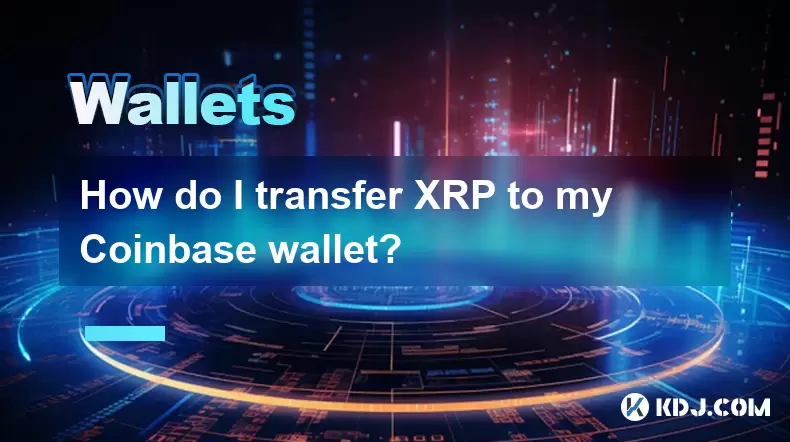
How do I transfer XRP to my Coinbase wallet?
Jun 16,2025 at 04:57pm
Understanding the Basics of XRP and Coinbase CompatibilityBefore initiating any transfer, it’s essential to confirm whether Coinbase supports XRP. As of recent updates, Coinbase has resumed offering XRP trading services on its platform after a period of uncertainty due to legal issues involving Ripple Labs. However, availability may vary depending on yo...

How do I deposit BNB into my Trust Wallet?
Jun 15,2025 at 03:56pm
Understanding BNB and Trust Wallet CompatibilityBefore initiating a deposit, it’s crucial to understand what BNB is and how it interacts with Trust Wallet. BNB (Binance Coin) is a utility token created by the Binance exchange. It can be used for paying transaction fees, participating in token sales, and more. Trust Wallet, on the other hand, is a mobile...
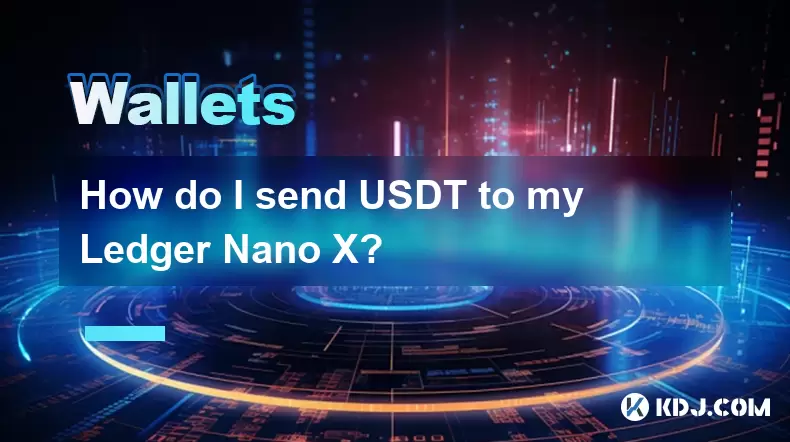
How do I send USDT to my Ledger Nano X?
Jun 15,2025 at 06:28am
What is USDT and Why Use Ledger Nano X?USDT, also known as Tether, is one of the most widely used stablecoins in the cryptocurrency ecosystem. It operates on various blockchain networks such as Ethereum (ERC-20), Tron (TRC-20), and others, offering users a digital asset pegged 1:1 to the US dollar. When it comes to storing USDT securely, hardware wallet...
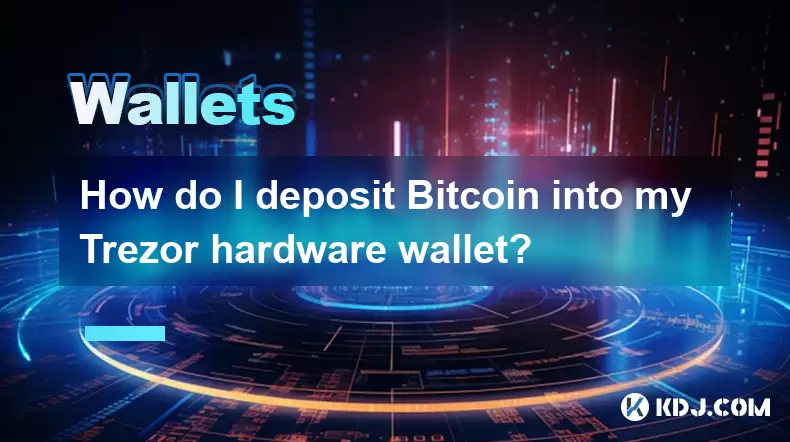
How do I deposit Bitcoin into my Trezor hardware wallet?
Jun 14,2025 at 12:29pm
What is a Trezor Hardware Wallet?A Trezor hardware wallet is a secure device designed to store cryptocurrencies offline, protecting them from online threats. Unlike software wallets, which are vulnerable to hacking and malware, Trezor stores private keys on the physical device itself. This ensures that transactions can only be approved by physically int...
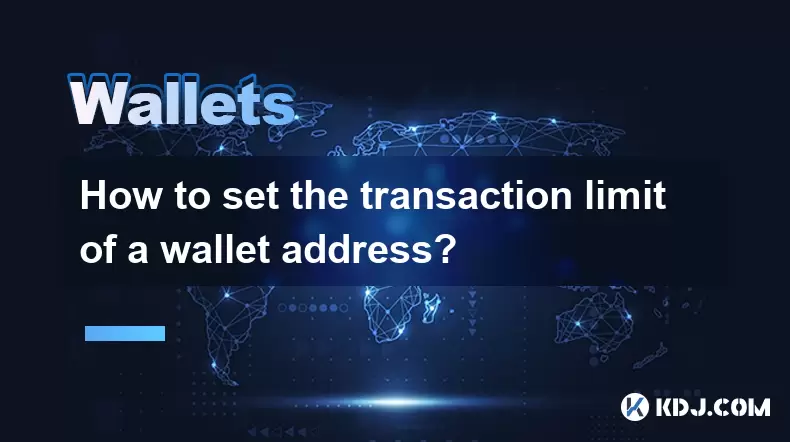
How to set the transaction limit of a wallet address?
Jun 16,2025 at 04:08am
Understanding the Concept of Transaction Limits in Cryptocurrency WalletsIn the cryptocurrency ecosystem, transaction limits refer to predefined restrictions placed on the amount of digital assets that can be sent or received by a wallet address within a specified timeframe. These limits are typically enforced by platforms such as exchanges, custodial w...
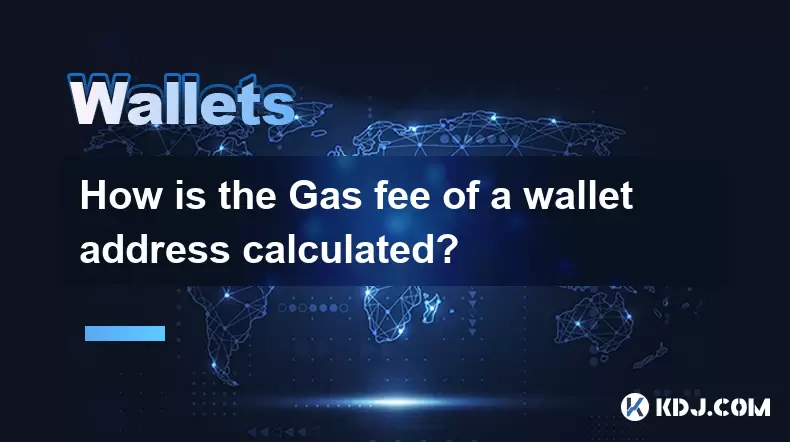
How is the Gas fee of a wallet address calculated?
Jun 14,2025 at 07:57pm
Understanding the Basics of Gas Fees in Blockchain TransactionsIn the cryptocurrency ecosystem, particularly within Ethereum-based networks, a Gas fee is an essential component of executing transactions or smart contract operations. The Gas fee serves as compensation for miners or validators who process and confirm transactions on the blockchain. It is ...

How do I transfer XRP to my Coinbase wallet?
Jun 16,2025 at 04:57pm
Understanding the Basics of XRP and Coinbase CompatibilityBefore initiating any transfer, it’s essential to confirm whether Coinbase supports XRP. As of recent updates, Coinbase has resumed offering XRP trading services on its platform after a period of uncertainty due to legal issues involving Ripple Labs. However, availability may vary depending on yo...

How do I deposit BNB into my Trust Wallet?
Jun 15,2025 at 03:56pm
Understanding BNB and Trust Wallet CompatibilityBefore initiating a deposit, it’s crucial to understand what BNB is and how it interacts with Trust Wallet. BNB (Binance Coin) is a utility token created by the Binance exchange. It can be used for paying transaction fees, participating in token sales, and more. Trust Wallet, on the other hand, is a mobile...

How do I send USDT to my Ledger Nano X?
Jun 15,2025 at 06:28am
What is USDT and Why Use Ledger Nano X?USDT, also known as Tether, is one of the most widely used stablecoins in the cryptocurrency ecosystem. It operates on various blockchain networks such as Ethereum (ERC-20), Tron (TRC-20), and others, offering users a digital asset pegged 1:1 to the US dollar. When it comes to storing USDT securely, hardware wallet...

How do I deposit Bitcoin into my Trezor hardware wallet?
Jun 14,2025 at 12:29pm
What is a Trezor Hardware Wallet?A Trezor hardware wallet is a secure device designed to store cryptocurrencies offline, protecting them from online threats. Unlike software wallets, which are vulnerable to hacking and malware, Trezor stores private keys on the physical device itself. This ensures that transactions can only be approved by physically int...

How to set the transaction limit of a wallet address?
Jun 16,2025 at 04:08am
Understanding the Concept of Transaction Limits in Cryptocurrency WalletsIn the cryptocurrency ecosystem, transaction limits refer to predefined restrictions placed on the amount of digital assets that can be sent or received by a wallet address within a specified timeframe. These limits are typically enforced by platforms such as exchanges, custodial w...

How is the Gas fee of a wallet address calculated?
Jun 14,2025 at 07:57pm
Understanding the Basics of Gas Fees in Blockchain TransactionsIn the cryptocurrency ecosystem, particularly within Ethereum-based networks, a Gas fee is an essential component of executing transactions or smart contract operations. The Gas fee serves as compensation for miners or validators who process and confirm transactions on the blockchain. It is ...
See all articles

























































































